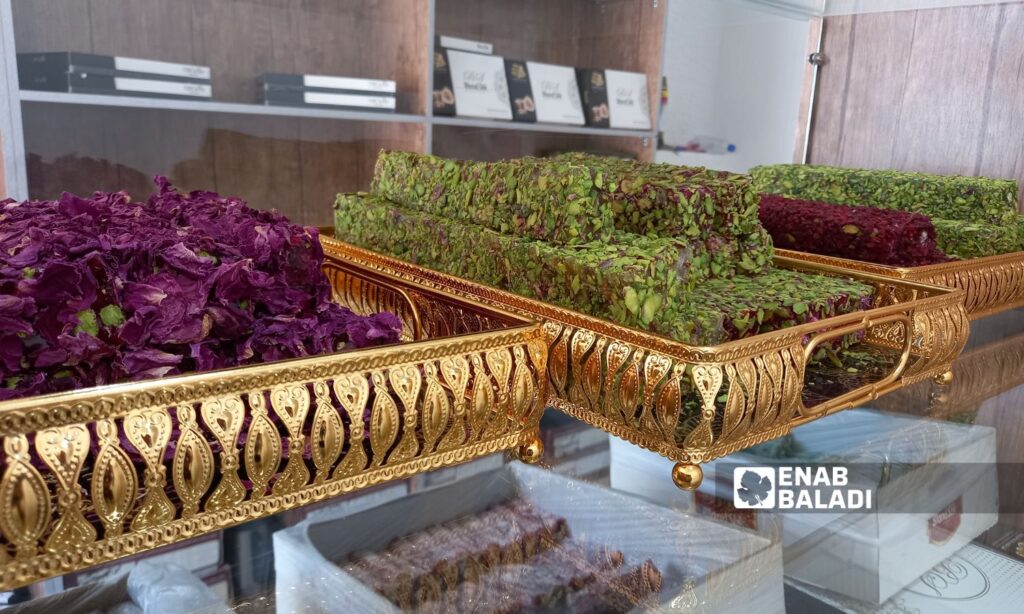Daraa – Sarah al-Ahmad
The trade and manufacture of Turkish delight, or “lokum” candies, in the city of Daraa, southern Syria, has gained popularity recently, in addition to the local Daraa “lokum” ( Daraawi Raha or Halkoum in Arabic), which the governorate is famous for, but the high cost of its manufacture keeps it in second place in popularity, as most of the time its purchase is limited to gifts.
Bassam al-Mahameed, a factory owner in the southern Daraa city, told Enab Baladi that he began making Turkish “lokum” in 2017 in a small factory with simple machines and a small number of workers with experience in the “lokum” making, explaining that this industry has begun to witness clear progress during the last period and a variety of shapes and flavors.
There are a number of factories that manufacture Turkish “lokum” in many types, including stuffed with “Mann and Salwa” sweets and pomegranates and dipped in roses or chocolate, nuts, and pistachios.
Al-Mahameed said that the raw materials used in the manufacture of the Daraawi and Turkish “lokum” do not differ much, and the difference in manufacturing between them is in the quantity of raw materials.
When making the Turkish “lokum,” it is necessary to reduce the quantity of glucose in it and reduce the cooking time so that the product is lightly sugared and does not stick to the hands.
A member of the Chamber of Commerce and Industry in Daraa, who requested that his name not be mentioned, told Enab Baladi that there are two factories that manufacture Turkish “lokum” in the city, one of which produces only Turkish delight, while the second manufactures the Daraawi “lokum” next to it.
He added that the Daraawi “lokum” factories had decreased to seven factories after their number had reached about 17 in the city of Daraa before 2011.
A candy shop selling Turkish delight, or “lokum,” in the southern city of Daraa – September 7, 2023 (Enab Baladi/Sarah al-Ahmad)
Only a domestic market
Mohammad al-Akrad, owner of the Turkish “lokum” factory in the city of Daraa, spoke to Enab Baladi about the difficulty of exporting the material to the governorates, especially distant ones like Aleppo and Homs, due to the difficulty of securing shipping vehicles from Daraa directly to these governorates, which prompts merchants to deliver the products to Damascus first and then re-ship it to other governorates according to demand.
Adnan Abu Zureiq, owner of one of the local “lokum” (Raha) factories in Daraa, told Enab Baladi that the “lokum” making has become somewhat expensive due to the rise in the prices of raw materials such as sugar, pistachios, and others, in addition to the rise in production materials related to energy, shipping, packaging, and others.
Due to its cheap prices compared to other types of sweets, “lokum” sales are still good in Daraa governorate, or the rest of the governorates, said Abu Zureiq.
Al-Mahameed said that the demand for buying Turkish “lokum” is “good,” but it is limited to giving gifts only, as most customers ask for it to be wrapped and placed in gift boxes, and due to the difficulty of transporting it outside the city, most of the production is sold locally.
There are more than 40 varieties of Daraawi “lokum” (Raha), the minimum selling price per kilo of which is about 12,000 pounds, while the selling price of Turkish delight ranges between 28,000 pounds and 160,000 pounds per kilo, depending on the type of filling, including nuts, chocolate, and other ingredients.
The reality of industry in most sectors in Syria suffers from many problems related to the absence of electricity and diesel, the inability to export products, the difference between the official exchange rate and the price on the black market, and the absence of governmental solutions to these problems, which prompted many industrialists to emigrate outside Syria.
The general level of prices also witnesses repeated, almost daily increases, affecting basic and food goods and materials, which further weaken the purchasing power of citizens in areas under regime control.
($1=13,050 SYP)

